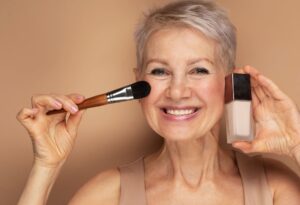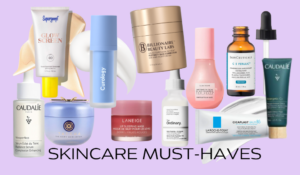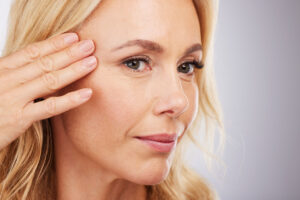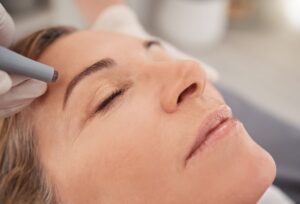In the world of skin care, efficacy reigns supreme: Does the product deliver demonstrable results in a reasonable amount of time? Does the treatment require too much investment — in money, in time, in possible pain? It’s a field rich in research because we’re all chasing that magic elixir to keep us looking as good as we do at this very moment (or the moment before).
So what’s next? We asked a few dermatologists and a researcher to do away with trends and instead share their thoughts on the breakthroughs that could change the very face of skin care. What they reveal could be your complexion’s next best friend.
Retinoid Application
 The Expert: Dr. Rachel Nazarian, dermatologist, Schweiger Dermatology Group in New York City
The Expert: Dr. Rachel Nazarian, dermatologist, Schweiger Dermatology Group in New York City
The Breakthroughs: Ingredient delivery systems, retinoids and retinoid alternatives
The Quotes: “We’re targeting new molecules and finding new ways to get the ideal ingredients to absorb better with superior products. For instance, microneedling is now being used to insert larger molecules of anti-aging products deeper into the skin and has been combined with hyaluronic acid, growth factors, and stem cells. The absorption is enhanced, and the products are much more potent when combined with this procedure.
“Retinoids are now being created in gentler yet still effective forms — like the development of the first prescription retinol in a lotion base. This makes retinoids accessible for people with sensitive skin who previously couldn’t use them. Even more exciting is that retinols are not being used as a monotherapy, or single-therapy, for skin; instead, the products being developed are targeting multiple pathways at once — in conjunction with retinols, antioxidants, extracts, and peptides, as well a load of anti-inflammatory ingredients, all of which not only make retinols more effective as an anti-aging tool but also help curb the dryness and irritation associated with them.
“Alternatives to retinol are being discovered and utilized much more now — which is needed due to the limitations of retinols for many people (those with sensitive skin or rosacea, or who are pregnant or breastfeeding).
Epigenetics

The Expert: Dr. Sabita Saldanha, assistant professor of biology, Department of Biological Sciences at Alabama State University
The Breakthrough: Epigenetics
The Quotes: “Epigenetics — the study of biological mechanisms that can switch genes on and off — is a process that’s gaining attention as its role in normal and diseased conditions are becoming apparent. It has promise in skin care; by adding molecules/compounds that affect epigenetic processes to skin care products, the expression of genes essential to skin rejuvenation, and repair can be turned on or induced. Because the skin is a major absorptive organ, topical creams that contain natural compounds with epigenetic properties could directly target the replenishing cells (stem cells) and building materials (collagen) for improved skin structure and maintenance. This targeted approach would focus on genes that affect stem cell multiplication and collagen production and structural formation.
“Are we far off from this becoming a reality? The human body is complicated, as it is regulated by its genetic makeup. Scientific research has been ongoing in the area of skin aging, not only to maintain a youthful state but also to address diseased conditions. However, like many conditions, aging is an amalgamation of environmental exposure and genetic makeup. Needless to say — and on a positive note — finding a natural molecule with potent epigenetic effects on skin stem cells will certainly pave the way to better anti-aging skin care treatments. Additionally, the skin is a highly absorptive organ, and the fact that this could all be done through topical applications that require minimal invasive regimens is exciting. With the fast pace of technology both in the pharmaceutical industry and scientific community, I believe this can happen in my lifetime.”
Platelet-Rich Plasma

The Expert: Dr. Tara Rao, dermatologist, Schweiger Dermatology Group in New York City
The Breakthrough: Platelet-rich plasma
The Quotes: “I think PRP (platelet-rich plasma) is at the forefront of skin care. PRP treatments are used more and more by dermatologists for rejuvenation of the skin as well as for hair loss. PRP is full of growth factors that support healing and collagen remodeling. Additionally, PRP gives women who seek natural products and treatments the most natural serum they can get—their own plasma.”







